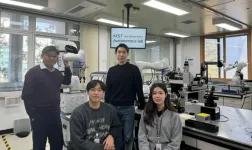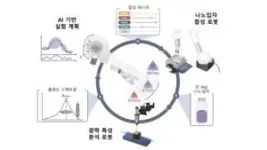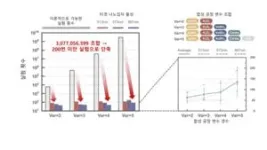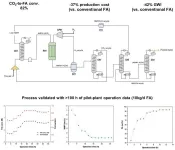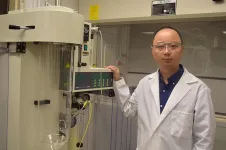(Press-News.org) In the early 20th century, the development of a catalyst for ammonia synthesis by the Haber-Bosch method took more than 10,000 experiments before it was successful. The development of new materials is a time-consuming and costly process from design to commercialization. However, in recent years, researchers have been working to shorten the development period by using artificial intelligence (AI). When combined with robots, it is possible to conduct material development research 24 hours a day, 365 days a year without human intervention.
The Korea Institute of Science and Technology (KIST) announced that Dr. Sang Soo, Han and Dr. Donghun, Kim of the Computational Science Research Center and Professor Kwan-Young Lee of the Department of Chemical Engineering and Biotechnology at Korea University (President Kim Dong-won) have developed a bespoke synthesis platform of nanomaterials using AI and robotics, called Smart Lab.
The KIST-Korea University joint research team first developed an automated device that synthesizes nanoparticles based on a robotic arm and measures the optical properties of the synthesized nanoparticles. By combining AI technology with this, a smart laboratory for bespoke synthesis of nanomaterials was developed, with which researchers can readily synthesize nanomaterials that meet their requirements just by inputting the desired material properties.
The AI technology applied to the Smart Lab platform combines a Bayesian optimization method with the early stopping technology to increase the efficiency for material discovery by more than 500 times compared to simple automated devices. Human experiments are often difficult to obtain reproducible results because the results are very sensitively dependent on the research environment and the proficiency of researchers; however, the developed smart lab has the advantage of producing consistent, high-quality data in large quantities.
The researchers also developed an AI technology to ensure the safety of smart labs. Although there is no risk of injury to researchers in unmanned smart labs, it is difficult to prevent safety accidents such as malfunctions due to robot overload. The researchers developed an AI vision technology (DenseSSD) to detect and prevent such safety accidents in advance and installed it in the smart lab. DenseSSD detects various objects in the lab, including research equipment and materials, and notifies users of any abnormalities so that they can take appropriate measures.
"The smart lab platform, which enables material development without human intervention, will be a new R&D paradigm that can solve the problem of declining research manpower due to aging," said Dr. Sang Soo, Han of KIST. "In the future, we plan to incorporate interactive language models such as ChatGPT to make it easier for non-experts to use the smart lab," said Dr. Donghun, Kim. The research team plans to expand the Smart Lab platform to various material fields such as catalysts, batteries, and displays.
###
KIST was established in 1966 as the first government-funded research institute in Korea. KIST now strives to solve national and social challenges and secure growth engines through leading and innovative research. For more information, please visit KIST’s website at https://eng.kist.re.kr/
The research was supported by the Ministry of Science and ICT (Minister Lee Jong-ho) through the Korea Research Foundation's Nano and Materials Technology Development Project, and the results were published online March 6 and February 22 in the international journals Advanced Functional Materials and npj Computational Materials, respectively.
END
Smart labs for bespoke synthesis of nanomaterials are emerging
Smart labs powered by AI robots are 500x more efficient in material development than simple automation. Expect a new R&D paradigm to address the aging research workforce.
2024-05-07
ELSE PRESS RELEASES FROM THIS DATE:
The commercialization of CO2 utilization technology to produce formic acid is imminent
2024-05-07
CCU (Carbon Capture & Utilization), which captures CO2 and converts it into useful compounds, is crucial for rapidly transitioning to a carbon-neutral society. While CCS (Carbon Capture & Storage), which only involves CO2 storage, has entered the initial commercialization stage due to its relatively simple process and low operational costs, CCU has only been explored at the research level due to the complexity of conversion processes and high production costs of compounds.
Dr. Lee Ung's team at the Clean Energy Research Center ...
Multisite review shows serious adverse events occur frequently in outpatient care
2024-05-06
Embargoed for release until 5:00 p.m. ET on Monday 6 May 2024
Annals of Internal Medicine Tip Sheet
@Annalsofim
Below please find summaries of new articles that will be published in the next issue of Annals of Internal Medicine. The summaries are not intended to substitute for the full articles as a source of information. This information is under strict embargo and by taking it into possession, media representatives are committing to the terms of the embargo not only on their own behalf, but also on behalf of the ...
Study highlights need for improvement of patient safety in outpatient settings
2024-05-06
KEY TAKEAWAYS
In a study of outpatient sites, researchers found that 7% of patients experienced at least one adverse event and 1.9% of patients experienced at least one preventable adverse event.
The most common adverse events in the outpatient setting were adverse drug events.
The findings highlight an urgent need to develop interventions to prevent both inpatient and outpatient harm.
Over the last several decades, research has brought nationwide awareness to issues of patient harm in the “inpatient” setting, where patients ...
Sylvester researchers develop a nanoparticle that can penetrate the blood-brain barrier
2024-05-06
MIAMI, FLORIDA (EMBARGOED UNTIL MAY 6, 2024 AT 3:00 P.M. EDT) – Researchers at Sylvester Comprehensive Cancer Center at the University of Miami Miller School of Medicine have developed a nanoparticle that can penetrate the blood-brain barrier. Their goal is to kill primary breast cancer tumors and brain metastases in one treatment, and their research shows the method can shrink breast and brain tumors in laboratory studies.
Brain metastases, as these secondary tumors are called, most commonly arise from solid tumors like breast, lung and colon cancer and are often associated with a poor prognosis. When cancer breaches ...
Caterbot? Robatapillar? It crawls with ease through loops and bends
2024-05-06
Engineers at Princeton and North Carolina State University have combined ancient paperfolding and modern materials science to create a soft robot that bends and twists through mazes with ease.
Soft robots can be challenging to guide because steering equipment often increases the robot’s rigidity and cuts its flexibility. The new design overcomes those problems by building the steering system directly into the robot’s body, said Tuo Zhao, a postdoctoral researcher at Princeton.
In an article published May 6 in the journal PNAS, the researchers describe how they created the robot out ...
Geologists, biologists unearth the atomic fingerprints of cancer
2024-05-06
Scientists at the University of Colorado Boulder and Princeton University have, for the first time, employed a tool often used in geology to detect the atomic fingerprints of cancer.
In a case of medicine meets earth science, the researchers discovered that cancer cells may be made from a different assortment of hydrogen atoms than healthy tissue. The findings could give doctors new strategies for studying how cancer grows and spreads—and may even, one day, lead to new ways to spot cancer early on in the body.
The team, led by CU Boulder geochemist Ashley Maloney, will publish its findings this week ...
Purdue pharmacy researcher receives $2.4 million NIH grant to fight antimicrobial-resistant lung infections
2024-05-06
WEST LAFAYETTE, Ind. — Qi “Tony” Zhou, a researcher in Purdue University’s College of Pharmacy has received a $2.4 million grant from the National Institutes of Health to fight lung infections that have established a resistance to antimicrobial drugs.
Zhou is an associate professor in the Department of Industrial and Molecular Pharmaceutics, a Faculty Scholar and a faculty member of the Purdue Institute for Drug Discovery and the Purdue Institute of Inflammation, Immunology and Infectious Disease. He leads a team of multinational experts from Australia, Thailand and the United States in developing novel, patent-pending ...
The Clues for Cleaner Water
2024-05-06
Researchers at the University of Pittsburgh and Drexel University in Philadelphia, along with Brookhaven National Laboratory, are working to solve a multipart mystery to make water disinfection treatments more sustainable.
Scalable electrochemical ozone production (EOP) technologies to disinfect dirty water may someday replace centralized chlorine treatments used today, whether in modern cities or remote villages. However, little is understood about EOP at the molecular level and how technologies that make it possible can be made to be efficient, economical, and sustainable.
Their research, “Interplay between Catalyst Corrosion and Homogeneous Reactive Oxygen Species ...
New $14.5 million center to help US Navy overcome emerging challenges
2024-05-06
Images
The U.S. Office of Naval Research is tapping academic expertise at the University of Michigan to solve current and future problems, Secretary of the Navy Carlos Del Toro announced during his visit to campus over graduation weekend.
The $14.5M Center for Naval Research and Education will also help train an engineering research community familiar with naval and marine applications.
"I am incredibly proud of the partnership between the University of Michigan and the Department of the Navy. Michigan is a key teammate in rebuilding our shipbuilding industry and restoring the comprehensive—commercial ...
Now available from Penn Nursing: innovative, online psychedelic course
2024-05-06
PHILADELPHIA (May 6, 2024) – Penn Nursing is proud to launch a groundbreaking new online course – Educating Nurses in Psychedelic Assisted Therapy – via Open Canvas. This free comprehensive course is designed to prepare nursing professionals for the pioneering field of psychedelic assisted therapy (PAT), aligning with the latest advancements in mental health treatment and Penn Nursing's commitment to social justice in healthcare.
With this new modality of care on the horizon, the need for well-educated, ...
LAST 30 PRESS RELEASES:
ASU researchers to lead AAAS panel on water insecurity in the United States
ASU professor Anne Stone to present at AAAS Conference in Phoenix on ancient origins of modern disease
Proposals for exploring viruses and skin as the next experimental quantum frontiers share US$30,000 science award
ASU researchers showcase scalable tech solutions for older adults living alone with cognitive decline at AAAS 2026
Scientists identify smooth regional trends in fruit fly survival strategies
Antipathy toward snakes? Your parents likely talked you into that at an early age
Sylvester Cancer Tip Sheet for Feb. 2026
Online exposure to medical misinformation concentrated among older adults
Telehealth improves access to genetic services for adult survivors of childhood cancers
Outdated mortality benchmarks risk missing early signs of famine and delay recognizing mass starvation
Newly discovered bacterium converts carbon dioxide into chemicals using electricity
Flipping and reversing mini-proteins could improve disease treatment
Scientists reveal major hidden source of atmospheric nitrogen pollution in fragile lake basin
Biochar emerges as a powerful tool for soil carbon neutrality and climate mitigation
Tiny cell messengers show big promise for safer protein and gene delivery
AMS releases statement regarding the decision to rescind EPA’s 2009 Endangerment Finding
Parents’ alcohol and drug use influences their children’s consumption, research shows
Modular assembly of chiral nitrogen-bridged rings achieved by palladium-catalyzed diastereoselective and enantioselective cascade cyclization reactions
Promoting civic engagement
AMS Science Preview: Hurricane slowdown, school snow days
Deforestation in the Amazon raises the surface temperature by 3 °C during the dry season
Model more accurately maps the impact of frost on corn crops
How did humans develop sharp vision? Lab-grown retinas show likely answer
Sour grapes? Taste, experience of sour foods depends on individual consumer
At AAAS, professor Krystal Tsosie argues the future of science must be Indigenous-led
From the lab to the living room: Decoding Parkinson’s patients movements in the real world
Research advances in porous materials, as highlighted in the 2025 Nobel Prize in Chemistry
Sally C. Morton, executive vice president of ASU Knowledge Enterprise, presents a bold and practical framework for moving research from discovery to real-world impact
Biochemical parameters in patients with diabetic nephropathy versus individuals with diabetes alone, non-diabetic nephropathy, and healthy controls
Muscular strength and mortality in women ages 63 to 99
[Press-News.org] Smart labs for bespoke synthesis of nanomaterials are emergingSmart labs powered by AI robots are 500x more efficient in material development than simple automation. Expect a new R&D paradigm to address the aging research workforce.
